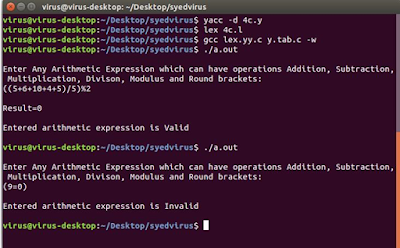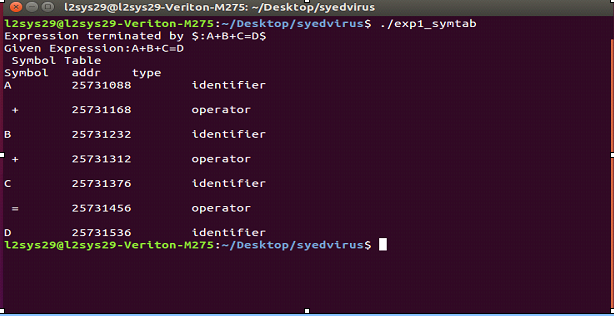IMPLEMENTATION OF CALCULATOR USING LEX & YACC
AIM:
To write a program for implementing a
calculator for computing the given expression using semantic rules of the YACC
tool and LEX.
ALGORITHM:
Step1: A Yacc source program has three
parts as follows:
Declarations %% translation rules %% supporting C routines
Step2: Declarations Section: This
section contains entries that:
i. Include standard I/O header file.
ii. Define global variables.
iii. Define the list rule as the place to
start processing.
iv. Define the tokens used by the parser. v.
Define the operators and their precedence.
Step3: Rules Section: The rules section defines the
rules that parse the input stream. Each rule of a grammar production and the associated semantic
action.
Step4: Programs Section: The programs section
contains the following subroutines. Because these subroutines are included in
this file, it is not necessary to use the yacc library when processing this
file.
Step5: Main- The required main program that calls the
yyparse subroutine to start the program.
Step6: yyerror(s) -This error-handling subroutine
only prints a syntax error message.
Step7: yywrap -The wrap-up subroutine that returns a
value of 1 when the end of input occurs. The calc.lex file contains include
statements for standard input and output, as programmar file information if we
use the -d flag with the yacc command. The y.tab.h file contains definitions
for the tokens that the parser program uses.
Step8: calc.lex contains the rules to
generate these tokens from the input stream.
PROGRAM CODE:
//Implementation of calculator using LEX
and YACC
LEX PART:
%{
#include<stdio.h>
#include "y.tab.h"
extern int yylval;
%}
%%
[0-9]+ {
yylval=atoi(yytext);
return NUMBER;
}
[\t] ;
[\n] return 0;
. return yytext[0];
%%
int yywrap()
{
return 1;
}
YACC PART:
%{
#include<stdio.h>
int flag=0;
%}
%token NUMBER
%left '+' '-'
%left '*' '/' '%'
%left '(' ')'
%%
ArithmeticExpression: E{
printf("\nResult=%d\n",$$);
return 0;
};
E:E'+'E {$$=$1+$3;}
|E'-'E {$$=$1-$3;}
|E'*'E {$$=$1*$3;}
|E'/'E {$$=$1/$3;}
|E'%'E {$$=$1%$3;}
|'('E')' {$$=$2;}
|
NUMBER {$$=$1;}
;
%%
void main()
{
printf("\nEnter Any Arithmetic Expression which can have operations
Addition, Subtraction, Multiplication, Divison, Modulus and Round
brackets:\n");
yyparse();
if(flag==0)
printf("\nEntered arithmetic expression is Valid\n\n");
}
void yyerror()
{
printf("\nEntered arithmetic expression is Invalid\n\n");
flag=1;
}
OUTPUT:



i want to make a floating point calculator. can you tell me where i make a change in code
ReplyDeleteThis comment has been removed by the author.
DeleteWhich is to be easy understanding..thnk u very much
ReplyDeleteWhich is to be easy understanding..thnk u very much
ReplyDeleteThis comment has been removed by a blog administrator.
ReplyDeleteThis comment has been removed by a blog administrator.
ReplyDeleteWonderful Post. This is a very helpful post. These are the useful tips for. I would like to share with my friends. To know more about me visit here Australia PR Point Calculator
ReplyDeleteHey Nice Blog!!! Thank you for sharing information. Wonderful blog & good post.Its really helpful for me, Australia PR Point Calculator
ReplyDeleteThe best Article that I have never seen before with useful content and very informative.Thanks for sharing info. Australia PR Point Calculator
ReplyDeleteThis comment has been removed by a blog administrator.
ReplyDeleteCasio calculator
ReplyDeleteThis comment has been removed by the author.
ReplyDeleteThis comment has been removed by the author.
ReplyDelete